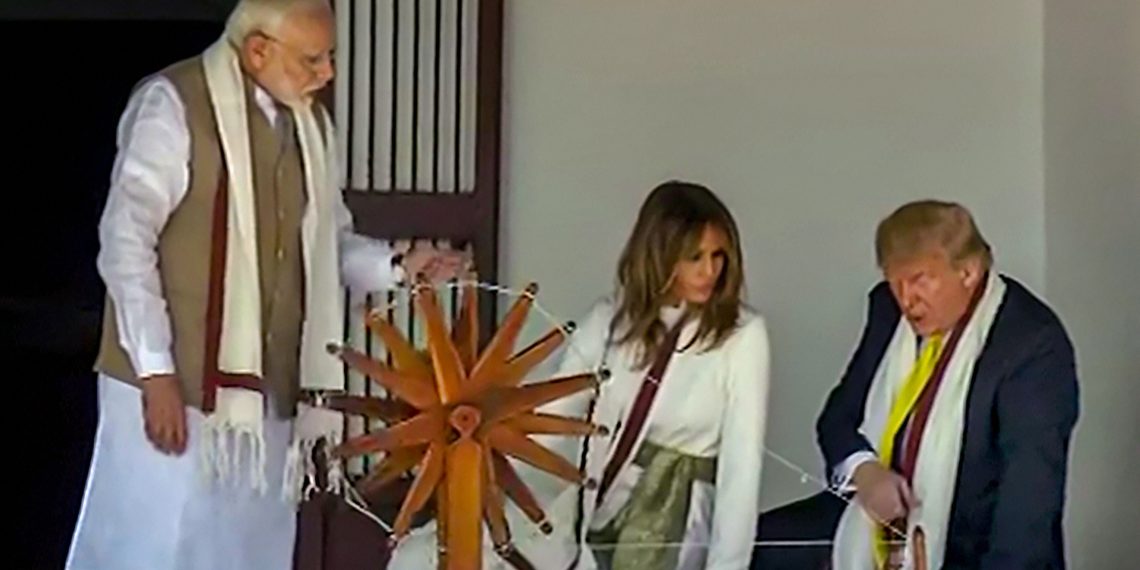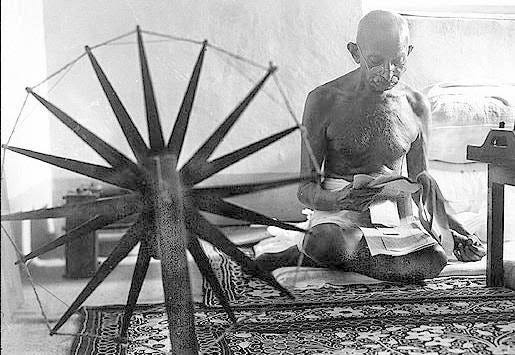First
I have this awesomely choreographed number from Coshish, have a listen -
Here’s
Conductor, another old but favourite hat, from Chandrabindoo in Bengali
Finally, I give you Childhood by Aditi Ramesh, another young musician based out of Bombay who combines elements of an Indian Classical music tradition called Carnatic with jazz.
Charkha, Cotton, Colonialism...
The Charkha is basically a manual spinning wheel. In the Indian context, however, it has morphed into a symbol of Swaraj or self-rule, self-reliance and rejection of colonial rule, and the man himself who created this transformation - Mohandas Karamchand Gandhi, revered as the Father of modern India.
 |
| Credit. POTUS with First Lady and Indian PM at the Gandhi Ashram spinning a replica of Gandhi's Charkha. |
The
irony of two leaders who dress in suits worth thousands of dollars, with exclusionary ideas on immigration at a
Charkha and at Gandhi’s workplace, well, I’m not even going there. The pictures
are enough to highlight the contrasts, you can draw your own conclusions. Let me tell you about the spinning wheel's role in Indian history instead.
Gandhi's early life was spent in Gujarat on the west coast of India and UK - he had gone there to study law, followed by several years in South Africa as a civil rights activist, where his political views matured (all good things have an Africa connection, remember? Cherchez la connexion l'Afrique!) He joined the struggle for Indian independence in 1915 at the request of Gopal Krishna Gokhale, another stalwart of the Independence movement.
 |
| Gandhi at his spinning wheel. Portrait taken by Margaret Bourke-White. Image source. |
At
the time, the British colonialists exported the Indian cotton grown by farmers to UK at cheap rates to mills in Lancashire where it was woven into fabrics. The finished goods were imported back into India and sold at high prices, thus depriving most Indians of the profits. The call for boycotting foreign goods first went out in 1905, at the first partition of Bengal. Gandhi revitalised it again in 1918 with the "Khadi" or the 'handspun' movement, where he took up manual spinning of a coarse cotton fabric called khaddar or khadi. The spinning wheel thus became a symbol of dignity of manual labour, self-reliance and rejection of foreign rule. And it also became irrevocably associated with Gandhi, as much as his trademark round spectacles.
Gandhi himself gave up wearing the elaborate, traditional clothing by 1921 and opted for the knee-length loincloth, worn by millions of the Indian working class peasants. He credited spinning at the Charkha with meditative properties also and encouraged everyone to try it. In fact, the story goes that he insisted on Margaret Bourke-White learn to spin the Charkha before he permitted her to photograph him.
The Indian National Congress was the first political party in the Afro-Asian continent, formed in 1885, to get involved in a movement for independence from colonialism. Gandhi became its President in 1924, but remained its unofficial leader till his death. His Charkha made its way into the proposed Indian Swaraj flag as a central motif in the 1920's, and was adopted in 1931 by the INC. It became a potent symbol of the Indian independence movement, being raised by protesters at civil disobedience rallies and marches. It remained on the flag till the current one was adopted, where the Charkha was changed to the Wheel taken from the Ashoka Pillar. The flag continues to be made of Khadi cloth as specified by the Indian law on flag standards. And Khadi cloth is still used both as a political and a fashion statement in India.
 |
| Credit. The Swaraj flag, officially adopted by the INC in 1931. |
Is there any other
fabric loaded with political significance? Do you know of other implements
which have come to symbolise the struggle for civil rights/justice?
And among all the super creative posts I visited yesterday, this one really captivated me with its content - Martha Reynolds Writes. Commendable!
And among all the super creative posts I visited yesterday, this one really captivated me with its content - Martha Reynolds Writes. Commendable!
A-Z Challenge 2020



I like that your posts pop up "early" for me. It's still Thursday, but I'm greeted with your letter C now, since you are on Friday. Just fun thinking about time and the world spinning along.
ReplyDeleteSpinning like a wheel - interesting history with Gandhi and his Charkha. And history spinning currently out of control and yet always with hope - just like independence.
My mind is wheeling and reeling. Good post
Over the last few months, I've been made more acutely aware of the time difference between countries. Time zone management is an entire branch of study in split continent living! :D
DeleteHistory has spun a bit out of control right now, but will spin back as well. Every action has an equal and opposite reaction. Glad you liked the post.
Thank you.
ReplyDeleteI suspect that silk is also laden with political significance. Political and economic (which are often cojoined twins) significance.
And thank you for the diversion from 'that photo' to teaching me more about Mohandus Gandhi.
Economy is what drives the politics. All wars are ultimately fought for money, paraphrasing someone here, possibly Rhett Butler? Or maybe a Greek philosopher :)
DeleteWeaving cloth is a better symbol of freedom than bombs bursting in air.
ReplyDeleteAgree wholeheartedly! Gandhi wove his way to independence.
DeleteWow, that image with the Trumps... ouch.
ReplyDeleteThan you for the history lesson! I was vaguely aware of this, but not in detail :)
The Multicolored Diary
The details were allowed to get a bit obscured till the rise of nationalistic leaders reopened discussion on the whole issue. :)
DeleteHari OM
ReplyDeleteLoved the music choices today, Nila... and even knowing the history, much enjoyed your take on the Khadi and Gandhi-ji! I too was thinking that silk would be another contentious fabric. YAM xx
Yup, silk would make another interesting bit of history to dig into.
DeleteI think the wool trade was very politically significant in parts of Europe, including Britain, but I am no historian, so don't know any details. I did not know the significance of the Charkha - we never studied that era at school. Of course it may have had something to do with the fact that if it came after the Tudors I wasn't overly interested. Thank you for enlightening me.
ReplyDeleteTasha 💖
Virginia's Parlour - The Manor (Adult concepts - nothing explicit in posts)
Tasha's Thinkings - Vampire Drabbles
I am not a history scholar either, OMG. Just enjoy reading odd bits and pieces here and there and finding commonalities between situations. Glad you liked reading.
Deletethanks for the info :)
ReplyDeleteanytime! :)
DeleteI appreciate Ghadi as he aimed with simplicity to make a profound statement. Not might against might but a spinning wheel for freedom.
ReplyDeleteWell done thank you for the time you spend to make a well written blog.
My Letter C
To stand with a spinning wheel against the huge might of tanks and guns would take a kind of courage we haven't seen in India for a long time. Thank you.
DeleteGreat songs, and a lot of informations here again, about Khadi cloth for example, I didn't knew it.
ReplyDeleteC is for Colour
Hand made stuff is prized in India, not just textiles but all kinds of handicrafts.
DeleteFascinating post - you're responsible for heading me down a rabbit hole to explore the Charkha more. While in an entirely different context than the political/social/economic implications you've covered here, I recently read a small book I'm still thinking about entitled "The Fabrics of Fairytale: Stories Spun Far and Wide."
ReplyDeleteWow, that sounds like an absolutely captivating book, Deborah! So, so intriguing! Thanks!
DeleteCool post, great info, fun music additions! Fabric with political significance.... Pox blankets? Colonists traded blankets tainted with diseases, like small pox, for food and such. The goal being to kill more Native Americans without looking like they had.
ReplyDeleteThat is absolutely diabolical! The colonists did some really dire things, I mean, to what depths of hate does a human being have to descend to think up something like that?!
DeleteSadly a lot ... and it didn't improve - but had been done by other empires and colonial powers ... and now .....? No change ...
DeleteYeah, nothing changes, that is the scariest part of all. We don't seem to learn anything from our past.
DeleteInteresting songs. Haven't heard them before!
ReplyDeleteAnna @ Deeply Shallow
Glad you enjoyed them, thanks.
DeleteHi Nila - fascinating read ... and to think about JL's Indian blankets ... money motivator ... no thought for humanity - I'm afraid.
ReplyDeleteCotton, Silk, wool and now bamboo ... I'm not going anywhere else with my thoughts - take care - Hilary
Bamboo is a fabric I find super intriguing!
DeleteI was filled with admiration and respect for Gandhi and his movement and then read J Lenni's comment. My mind went elsewhere. The horrible thoughts I have regarding our current events and they way it'll be used to delete those with the least access to help in the richest country in the world. Our leader is using it now against his political enemies!
ReplyDeleteNo different in my country either - no thought for the under privileged and the poor. Life is so cheap from the POV of the politicians. J Lenni's comment turned my brain inside out really...horrific, uff!
DeleteI've never seen a spinning wheel like that before, and I love the story that goes with it. I will refrain from commenting about the photo of The Man Who Shall Not Be Named and his wife, because I know I can't be nice about it.
ReplyDelete